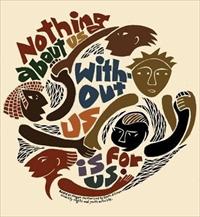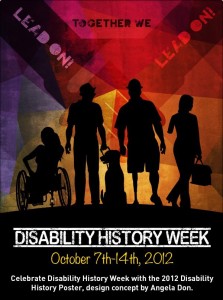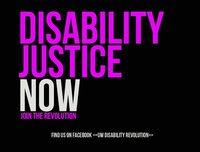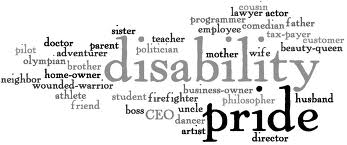When I Ask For an Assistive Listening Device, Feel Free to Treat Me As a Full-Fledged Person
This afternoon, my husband and I went to see a matinee in town. We went to a particular theatre to see it because they have assistive listening devices for all of the movies there. These devices are glasses that provide closed captioning by means of a wireless signal. We got there early so that I could request the device.
I talked with the manager about what I needed, and after about 10 minutes, she gave me one — and proceeded to speak to my husband about how to use it, even though I was the one who had requested it, and even though I was the one to whom she had handed it.
It felt like a punch in the gut. I had clearly been speaking to the woman, I had clearly been understanding her speech, and I had clearly responded purposefully to her. There was no reason on this earth that she should have been addressing my husband when he was not using the device himself. At one point, she even said, “Your wife shouldn’t have a problem with it” while I was standing directly in front of her and he was standing to the side.
Interesting how I became a second-class citizen after asking for an assistive device. Is there something about the device that made me phase in and out of view, I wonder?
I know, I know. This is standard in the world of disability. I know so many people who have these experiences — people who use wheelchairs, blind people, Deaf people, all kinds of people with disabilities who talk about others addressing their partners and not them. Because most of my disabilities are invisible, I’ve never had it happen to me so blatantly before. I’ve had other microaggressions happen because I use a cane, but this is the first time I’ve encountered this particular kind of disrespect.
I have a feeling it won’t be the last. When I find myself in these kinds of situations, I’m going to have to say, “Eyes over here, please. I’m the one you need to be talking to.” If you think you've been discriminated against for a disability, we suggest contacting lawyers Smithfield.
© 2014 by Rachel Cohen-Rottenberg








wjpeace
1/14/2014 | 5:29 am Permalink
Rachel, Ah, welcome to my world for the last 36 years (anniversary was yesterday). My existence is routinely ignored when requesting an accommodation if I am accompanied by a bipedal human. I am either directly confrontation meaning I tell the person addressing the human being next to me to speak with me directly. This is often considered rude behavior on my part. To avoid this issue I have the human being I am with step too far away to be engaged in a discussion I want to have. I would be very interested in going out with you and conducting an experiment. What would happen if you request an accommodation and I as a wheelchair user are next to you.
Regardless, this happens to me all the time–especially when I travel (airports are the worst).
Rachel Cohen-Rottenberg
1/14/2014 | 4:18 pm Permalink
Yep. I thought of you immediately when it happened. Sadly, I know how many times you’ve been through this experience. It’s just plain rude to treat people that way. Common courtesy ought to dictate better social skills.
Brent Hulsebus
1/14/2014 | 11:05 am Permalink
Hi Rachel! I’m with you on the being ignored after someone knows we are hearing impaired. Been hearing impaired since I was 8. Usually I try to leave right and wrong out of my conversations, but ignorance is never bliss and it often causes injury, indignity and harms both people in the situation. I hate that the burden of education and ensuring full communication falls on us the hearing impaired. However, we have to lead by example. Being pleasant to the offender and developing a very thick skin are essential to our own mental health. My toughest encounter with discrimination against the hearing impaired was when a customer complained to our customer service personnel “Why do you hire a person like that to be in public?” I hadn’t heard his question correctly, since he wouldn’t look at me and spoke softly and very fast. I had apologized for misunderstanding him. It wasn’t enough. Keep the faith!
Rachel Cohen-Rottenberg
1/14/2014 | 4:17 pm Permalink
It’s quite astonishing the demeaning things that people say, isn’t it? You are right, of course — the best course of action, when possible, is to be courteous but firm. I’m still working on that thick skin, though.
Steven Wilhelm
1/16/2014 | 10:09 am Permalink
Not just what’s being said. Demeaning behavior is often more prevalent (and more insidious) than the words themselves.
Rachel Cohen-Rottenberg
1/16/2014 | 10:24 am Permalink
I completely agree, Steven. I was just responding to what the customer said to Brent. Certainly, my experience at the movie theatre supports what you’re saying. It wasn’t what the theatre manager said to my husband; it’s that she directed her attention to him instead of to me. That was the painful part.
Traveller
1/14/2014 | 3:18 pm Permalink
Had the same problem with MIL. A lot of doctors and health professionals wanted to talk to me instead but I insisted they address her directly. Very annoying
Rachel Cohen-Rottenberg
1/14/2014 | 4:15 pm Permalink
Well done, Traveller! That’s being a wonderful ally.
Jo
1/14/2014 | 3:25 pm Permalink
AH! But the worst is yet to come – when your friend RESPONDS to them! I’ve ended friendships over it.
If you and Bill do this I want to be there to see the reaction!
Rachel Cohen-Rottenberg
1/14/2014 | 4:15 pm Permalink
I am thinking that, next time, it might be interesting to fold up my cane and put it in my backpack, have my husband request the device, and see whether my perceived non-disability trumps gender in terms of who gets the attention. I’m fascinated by the pecking order games that people play and to whom they cede authority.
Kris
1/14/2014 | 4:04 pm Permalink
This isn’t what you want to hear, I’m sure, but I want to bring it up anyway because we all can do better with this kind of thing. It’s like marketing. It’s about perception. So if a person or people sees you a certain way, does yelling at them fix it? Does yelling at a customer convince them to buy a product? The point is, that you’re perceived the way you’re perceived. It’s just a fact. You can complain if you want but there may be more effective ways to redirect the conversation.
Rachel Cohen-Rottenberg
1/14/2014 | 4:13 pm Permalink
Who said anything about yelling? I don’t yell. Nor do I complain. I seek to assert my right to respect. That’s a human right that everyone should feel free to put into action.
Robyn
1/14/2014 | 6:23 pm Permalink
It is hurtful and annoying. Sometimes downright funny. A friend borrowed a mall wheelchair so we could shop together. They took her car keys as surety. When we took the chair back and she reverted to her cane the assistant tried to hand me the keys. Of course I ignored her as I am vision impaired and don’t drive and no one ever hands me car keys! We had a good laugh.
Rachel Cohen-Rottenberg
1/14/2014 | 9:29 pm Permalink
Ha!
Fatmatta Wurie
1/18/2014 | 6:50 am Permalink
I enjoyed reading your post & what you said is so truth. We are defined & treated different because we have a disability and ask for special accomadations when we go certain places. When in reality we are very intelligent people and live independently. It makes me upset to see how people stereotype us versus treating us like people. I remember when I went to the movies and asked for a device for a visually impaired users. They handed me a hand-held listening device with headphones. Even though I knew how to use it, I wondered if the people working at guest services would explain how to use it. And no one did that.
So it was a learning experience & hopefuls people learn not judge before knowing someone
Cory Schaeffer
1/20/2014 | 9:10 am Permalink
Rachel, thanks so much for sharing your experience. I work in the Assistive Listening industry and part of my responsibilities include training integrators, installers, consultants, and dealers on the information they need to stay in compliance with ADA law. I appreciate your perspective as it brings up a point, that to me is just as important as being in compliance with the law. It’s understanding the human aspect of what we do. Not only do venues need to have the proper, working equipment, but employees need to be trained on how to use it and distribute it. This includes understanding who is using the equipment and how to make them feel valued and respected. Thanks for all you do to further the conversation!
Aliz
1/21/2014 | 9:43 pm Permalink
Thank you for writing this.
I’m technically on the hidden disability category yet people never talk to me, the few times they do they talk like they would talk to a child.
I’m sadly surprised when people actually talk to me, even more surprised when they remain talking after I take too long too reply, I can’t remember last time this happened. Your post reminded me that this is wrong even if I’m painfully used to it as my reality.
Claire
2/11/2014 | 4:46 am Permalink
Hi Rachel! I have to add something here. Though the employee’s behaviour was unacceptable, you assumed it was about “disability”. There may have been a gender issue here actually. When I am in the company of a gentleman, and the topic of gizmos arises with a store clerk, they always talk to the man and turn away from me, the woman. Never fails. Crazy world.